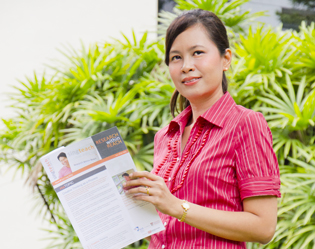Young Children’s Voices in Mathematical Problem Solving
Contributed by Dr Ho Siew Yin and Sng Wei Qin Abbie, from NTUC First Campus, for SingTeach Virtual […]
Read More
When she was a School Staff Developer, Ms Dalina Abdullah had some pretty big questions on her mind about professional development of teachers and the work they do. How do they choose among different pedagogies? How should they plan the curriculum so students can learn better? These questions “plagued” her, so she decided to find answers for herself.
“The realization of any educational goal, end and purpose depends on the professionalism of teachers,” wrote Dalina, in the opening line of her Master’s thesis.
She believes that teacher professionalism must be studied from the teachers’ perspective. At the same time, she was keen to find out how teachers go about planning a curriculum.
As part of the research for her Master’s, she decided to observe two teams of teachers in a secondary school as they developed a curriculum for lower secondary Humanities in History and Geography.

“I was trying to explore teachers’ experience and enactment of professionalism in terms of planning the curriculum,” explains Dalina, now Head of the English Language Department at Tanglin Secondary School.
She was also interested in the types of knowledge and beliefs they drew upon as they did so.
Using MOE’s 2013 Humanities syllabus as a basis, the teachers met often to conceptualize their curriculum. “I looked at how the teachers generated alternatives for the curriculum, and how they selected the details to include.”
The work that teachers do is closely tied to teacher professionalism. “It is critical to realizing educational goals,” says Dalina.
– Ms Dalina Abdullah, Tanglin Secondary School
Teacher professionalism is often linked to teachers’ knowledge, responsibility and autonomy. “Very broadly, we are talking about the quality of teachers’ work, how they respond to educational issues and changes. We can also be talking about teachers’ public image.”
It is, however, an evolving concept. “In the newly emerging discourse, we also have collaboration, reflection and continuous learning.” The focus is increasingly process-oriented and includes the moral and social aspects of teachers’ work.
There are many descriptions of teacher professionalism in the literature, but what does it look like in practice?
Dalina found that curriculum planning is complex work. Many alternatives need to be considered before decisions can be made.
In planning the curriculum, the Humanities teachers had to draw on their broad base of knowledge – a hallmark of professionalism.
They used their knowledge in many different areas, such as pedagogy, subject content, their students, and the milieu (the classroom, school environment, and even the national context).
They also tapped on external sources of knowledge, thus expanding their own. For example, when the Geography team was planning for fieldwork, they also referred to practices of teachers and learning communities outside their school. In this way, they could generate more alternatives.
“In generating and selecting those alternatives, they will be able to see the impact of one choice when weighed against the other,” explains Dalina.
When there are so many factors and alternatives to consider, some can be easily overlooked. That’s why teachers deliberate a lot in curriculum planning.
Very often, they need to go deeper in their deliberations to come up with a defensible curriculum. A strong facilitator or leader can direct them to consider what they had not thought of before.
– Dalina on curriculum work
There are so many curriculum frameworks teachers can pick and choose from. But the frameworks shouldn’t be used as ready-made templates.
“We do not want the teachers’ ability to see the goals of the curriculum to be limited by the frameworks,” cautions Dalina. “We need to think about how best to use them.”
“We want teachers to see the broader goals and nature of the curriculum problems they are trying to resolve. We want them to generate sufficient ideas and go through the process of deliberation.”
“We must look at curriculum planning and development as a process,” stresses Dalina. It’s a long one that requires time and effort. Should our already busy teachers be doing it then?
The effort that teachers put into curriculum work should not be seen as separate from their daily work of teaching, says Dalina. It is part and parcel of the profession.
One teacher shared that curriculum work helped her to teach with greater clarity because she now understood it better. Another said she now knows what objectives to achieve in the classroom.
“The process is ongoing, and it will take the teachers time and effort,” says Dalina. But the gains from this kind of work make it worthwhile.
Reference
Abdullah, D. (2012). Exploring teacher professionalism: A case study of teachers’ work in curriculum planning and development (Master’s thesis). Retrieved from the NIE Digital Repository: https://repository.nie.edu.sg/jspui/handle/10497/4724